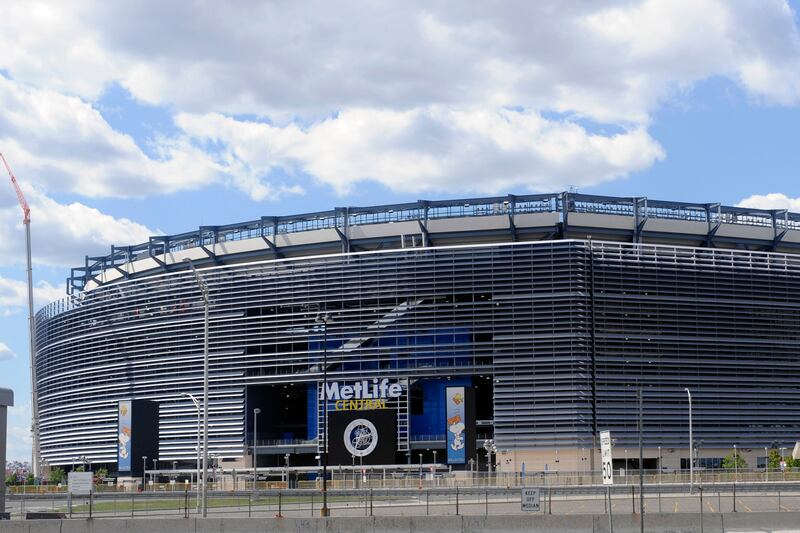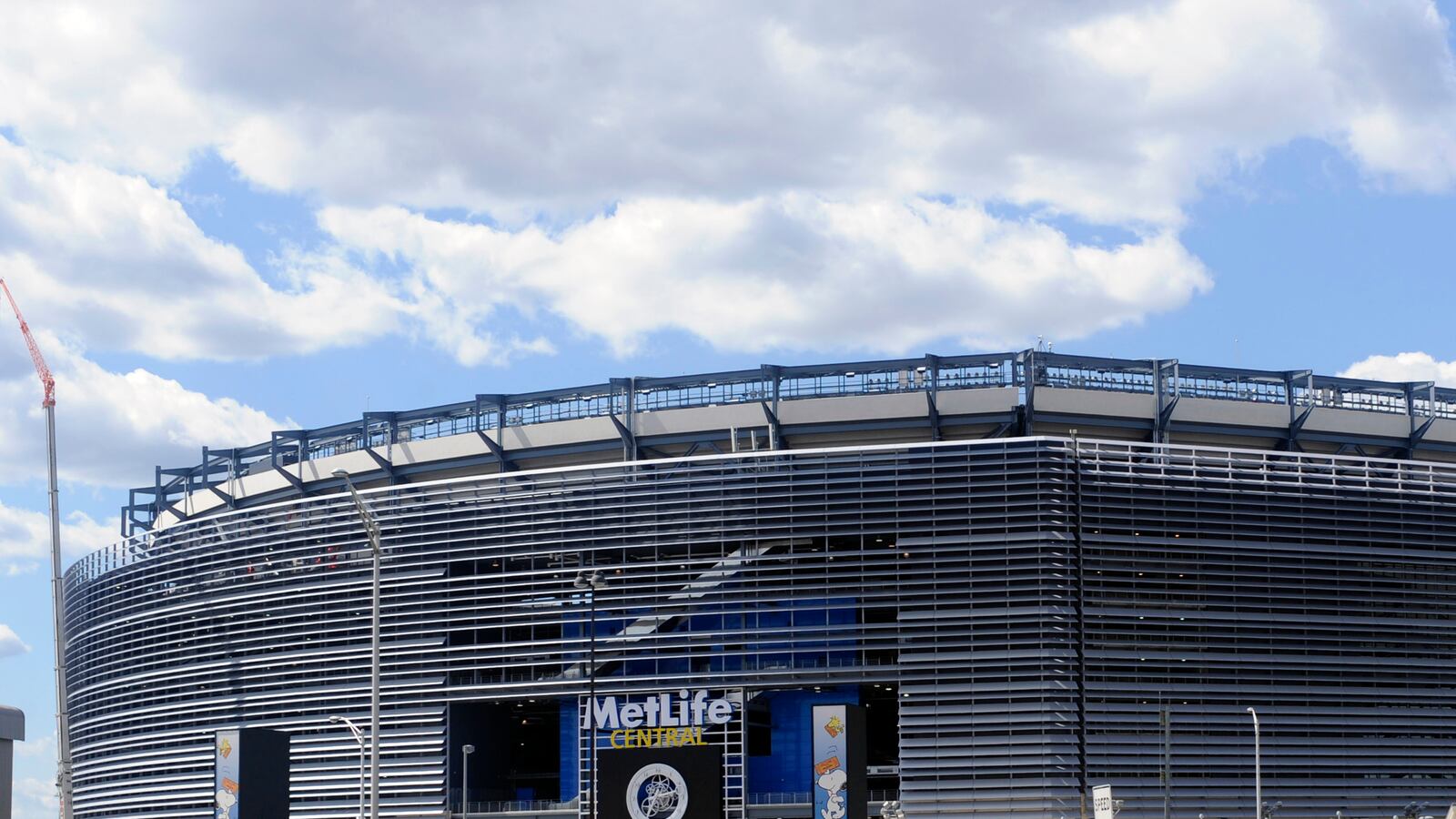Super Bowl XLVIII, or 48, for those who failed Roman numbers in school, will be quite different from the previous 45 Super Bowls and two American Football League–National Football League World Championships that have been played. The next Super Bowl will return football’s championship showcase to its western Pennsylvania coal miner's roots, outdoors with the possibility of elements—cold weather, ice, and snow—impacting the game, which is scheduled for Feb. 2, 2014, in East Rutherford, NJ.

Why the NFL owners decided to ditch the “let's try to play the game in a near perfect setting for corporate ticket holders and partners” seems to have something to do with a Sept. 11 remembrance, or at least that was one of the initial reasons given. That doesn't seem to fly, though, because by the time the game is played it will be 12 1/2 years after the terrorist attack.
The NFL's real reason, though officially unstated, for choosing the Meadowlands site is all about money. NFL owners "reward" communities that put up money for new facilities and the owners. NFL owners no longer have a rotation set of warm-weather cities such as Miami, Tampa, New Orleans, San Diego, or Pasadena/Los Angeles that automatically host games.
League owners awarded the 2004 and 2006 bowls to Houston and Detroit because taxpayers funded new stadiums in those cities. The Valley of the Sun, the Phoenix metropolitan area, hosted the 2008 game after voters said yes to funding a facility in Glendale, Arizona. Arlington, Texas, was rewarded with the 2011 game after local residents agreed to pay for half of Jerry Jones’s new Dallas Cowboys stadium by approving a local sales tax hike. Indianapolis got the 2012 Super Bowl after local politicians agreed to fund a new stadium. Some of these deals give local owners virtually all (92 percent) of the stadium-generated revenues from every event in the building. It is assumed that the new stadium in Santa Clara, California, which will house the San Francisco 49ers in a couple of years, will get a Super Bowl, since Santa Clara residents are spending hundreds of millions of dollars for that facility.
No wonder NFL owners are putting "The Big Game" in different cities. It is an easy thank-you for locals who are footing stadium costs.
Miami, which used to regularly host the Super Bowl, is out until Miami-Dade or Broward County or the state spends taxpayer dollars to either upgrade the area's existing stadium, or build a new one for Stephen Ross's Miami Dolphins. The same holds true in San Diego, with the Chargers.
New Orleans was dropped from the rotation until the Superdome was rebuilt. The league's owners, showing they truly care about Hurricane Katrina survivors and the Gulf Coast, threw the 2013 Super Bowl to the city in an effort to show the world it was recovering from Katrina's devastating impact after Louisiana spent hundreds of millions of dollars on reconstruction.
New Orleans Saints owner Tom Benson has a renovated Superdome complete with all the toys and gadgets befitting an NFL owner, including naming rights, expensive club seats and luxury boxes, and cash grants from Louisiana as a thank-you for remaining in the city—although those handouts are considerably less than the ones he received between 2002 and 2010, when the state handed over $186.5 million to make sure Benson could keep up with other cities. But Benson has all sorts of new goodies that Louisiana Gov. Bobby Jindal and the two statehouse chambers gave him in his new lease, including a tax-free zone around the stadium's outside plaza.
The East Rutherford Super Bowl is a thank-you to New Jersey for paying $300 million in infrastructure for the new Meadowlands stadium. New Jersey also made sure East Rutherford is not getting full property-tax payments from the Giants/Jets owners for the land. East Rutherford is getting about 10 percent of the estimated property tax—less than $2 million—and a $5 million annual rent payment.
New Jersey should not assume that NFL owners are satisfied with Gov. Chris Christie's efforts to meet their needs and wishes. The governor is pushing for a sports book in Atlantic City, and NFL owners (along with NCAA officials and other leagues) are in a court battle trying to make sure New Jersey voters’ bid wishes it is quashed. The NFL has already said New Jersey will never get another Super Bowl if Atlantic City gets a sports book. The NCAA has pulled some Division III championship events from the state.
The Super Bowl is more than just a game. It took an act of Congress and President Lyndon B. Johnson’s pen to create the game. The American Football League and National Football League jointly announced an intent to merge on June 8, 1966. The merger would fly in the face of the Sherman Antitrust Act, so NFL Commissioner Pete Rozelle was told to make sure the United States Senate and the House of Representatives crafted legislation that would enable the leagues to consolidate.
Rozelle was rebuffed by Louisiana Democrat Russell Long in the Senate, and Louisiana Democrat Hale Boggs in the House, because they saw no reason that it was in Louisiana's best interest to merge the leagues. New Orleans didn't have a team. Rozelle wasn't offering a team either. New Orleans had blown an opportunity to house an American Football League franchise in 1965 because of Jim Crow—which led to African-American players boycotting the January 1965 AFL All-Star Game scheduled for the city. The game was moved to Houston, and a planned announcement that New Orleans was joining the AFL was canceled.
Eventually, Rozelle would trade a New Orleans franchise for Long's yes vote in the Senate and Boggs's yes vote in the House. The merger bill ended up on Johnson's desk in October 1966. He signed it and New Orleans had a franchise on November 1, 1966—All Saints Day. The first Super Bowl, although it wasn't called that, took place on January 15, 1967, in Los Angeles.
The Super Bowl will be played in Glendale, Arizona, in 2015. Sometime in March, NFL owners will hand out the 2016 game, but that contest doesn't figure to be played in a cold-weather city. The owners need to review how the Meadowlands game and the New York City–based events go before making a judgment on other cold-weather venues such as Dan Snyder's Washington Redskins stadium in Landover, Maryland, or Robert Kraft's New England Patriots facility in Foxboro, Massachusetts, or Pat Bowlen's Denver Broncos building.
Given that Snyder’s Redskins are in the nation's capital and that Kraft and Bowlen are NFL power brokers, it would be something of an upset if the NFL doesn't start implementing a cold-weather game every four years—giving those owners games. One of those cold-weather venues may become an international “fixture” in a decade or so. The NFL is determined to establish a permanent base in London, England, and could use the placement of a Super Bowl in London as a “fixture” on the schedule as a major sales point to seal a deal in the U.K.
A Super Bowl in London might not be in the best interests of the NFL, though. After all, Congress created the big game, and may not have the stomach to see America's excuse for a holiday ripped out of the United States as the owners search for additional pounds, euros, and yuan.





